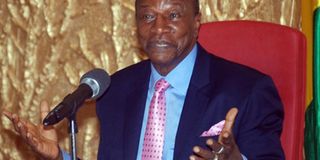Guinea president backs use of force to eradicate Ebola

President Alpha Conde of Guinea during a press conference on November 26, 2014 at the presidential palace in Conakry. AFP PHOTO | CELLOU BINANI
What you need to know:
- "If people don't want to be treated we will use force because we won't allow the illness to spread despite all our efforts," he said.
- Responding to protests over the deployment, the government this month said the area would be demilitarised and many people have now returned.
CONAKRY
Guinean President Alpha Conde on Wednesday said the use of force was entirely justified in battling the deadly Ebola outbreak that surfaced in the impoverished west African nation at the start of the year.
"There are still people who think Ebola is fiction," Conde told a news conference in a country where an eight-member Ebola education team was murdered by angry villagers in September.
"We have an agenda which is to finish with Ebola as soon as possible and in Guinea this is possible.
"If people don't want to be treated we will use force because we won't allow the illness to spread despite all our efforts," he said.
The spread of Ebola in Guinea has been accompanied by fear and paranoia among some villagers who feel the government and the international community cannot be trusted.
Following the murders of the Ebola outreach team in the southern town of Womey, the army was deployed there, triggering the departure of thousands of people.
PROTESTS
Responding to protests over the deployment, the government this month said the area would be demilitarised and many people have now returned.
Meanwhile in Freetown, official sources said around 100 Nigerian doctors were expected at the end of the week to help combat Ebola in Sierra Leone.
Nigeria, where eight people died from Ebola out of 20 cases, was last month officially declared Ebola-free.
The regional west African organisation ECOWAS this week started training in Ghana some 150 medical staff from seven countries who are to be sent to Ebola-hit Liberia, Sierra Leone and Guinea.
The haemorrhagic fever has killed nearly 5,500 people and infected more than 15,000, mainly in those three countries, according to the latest figures from the World Health Organization.





